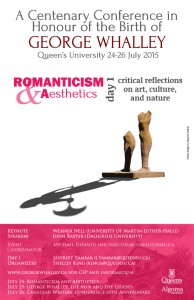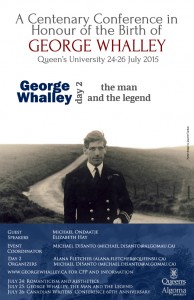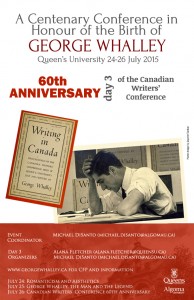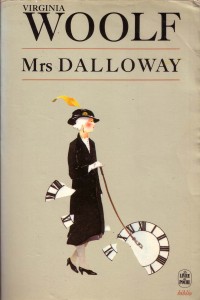Archives
Archive for September, 2014
September 26, 2014
EMiC @DHSI2015
We are pleased to announce that Editing Modernism in Canada will once again be partnering with the Digital Humanities Summer Institute (DHSI) in order to offer opportunities for project members to participate in DH courses offered over three weeks at the University of Victoria: June 1st-5th 2015, June 8th-12th 2015, and June 15th-19th 2015.
Registration for DHSI is now open. This year will see an expansion from the regular 1 week institute to 3 weeks of courses, in part to support those enrolled in the Graduate Certificate in Digital Humanities at U Victoria. Participants may choose to attend 1, 2, or all 3 week-long sessions. In 2015, 40 courses ranging from old favourites to exciting first-time ventures will be on offer. Each week of DHSI will include a week-long training workshop, and the core week (June 8th-12th) will also include morning colloquia, lunchtime unconferences, and Birds-of-a-Feather sessions. Throughout the institute, keynotes will be delivered by Malte Rehbein (U Passau), David Hoover (NYU), Claire Warwick (UC London), and Constance Crompton (UBC Okanagan). Tuition scholarships are available for students, and other EMiC participants (co-applicants, collaborators, postdocs, partners) can register at a discounted cost of $300.00 for students and $650.00 for non-students (for registration before April 1st 2015).
EMiC Director Dean Irvine will be teaching “Digital Indigeneity” at DHSI 2015 during the core week. For a full list of courses, to register, to apply for a tuition scholarship, or for more information, please go to dhsi.org. Make sure to register with an EMiC discount code (EMiC-Student or EMiC-Non-Student).
Please note that although we can offer discounted registrations for DHSI 2015, we cannot offer subventions for travel or accommodations. There is no application process this year. You should register directly through the dhsi.org website and arrange for your own transportation and accommodations. Students are strongly encouraged to take advantage of the generous DHSI tuition scholarship program.
In the meantime, keep posting your DH stories on the EMiC blog. And watch out for the public launch of the Modernist Commons later this fall. We’re in the process of trying to arrange on-site workshops for early adopters of the Modernist Commons; if your institution may be interested in hosting a workshop, contact us at emic@dal.ca.
September 19, 2014
Whalley Conference site and posters
At the George Whalley website a section is now dedicated to the conference in honour of Whalley to be held at Queen’s University, 24-26 July 2015. An attractive poster for each of the three days has been designed by Jaspreet Tambar, a graduate student at Queen’s University.
The call for papers for the first day is available here.
The call for papers for the second day is available here.
The call for papers for the third day is available here.
The deadline for proposals is 15 January 2015.
September 15, 2014
George Whalley Film Biography
A short film biography of George Whalley is now available here. It has also been published on Youtube here. It is meant to be a concise introduction to Whalley’s life and works.
The film production is by Evan Wainio, an undergraduate film student at York University. He used photographs from the Whalley Estate, Queen’s University Archives, Bishop’s University Archives, Victoria University Library (Toronto), the Imperial War Museum, the German Federal Archives, and the Naval Historical Foundation. Some individuals also provided photos for the film.
The narrator is Brian Brockenshire. I wrote the script.
With some luck, the film will bring to Whalley’s life and writings some renewed attention leading up to the conference in honour of the centenary of his birth to be held at Queen’s University, 24-26 July 2015.
September 11, 2014
CFP: Codex-tensions: Canadian Writing Beyond the Book-Machine
CFP: Codex-tensions: Canadian Writing Beyond the Book-Machine
Member-Organized Session for ACCUTE 2015 (30 May – 2 June 2015) in Ottawa
Panel organized by Christopher Doody (Carleton U) & Eric Schmaltz (York U) 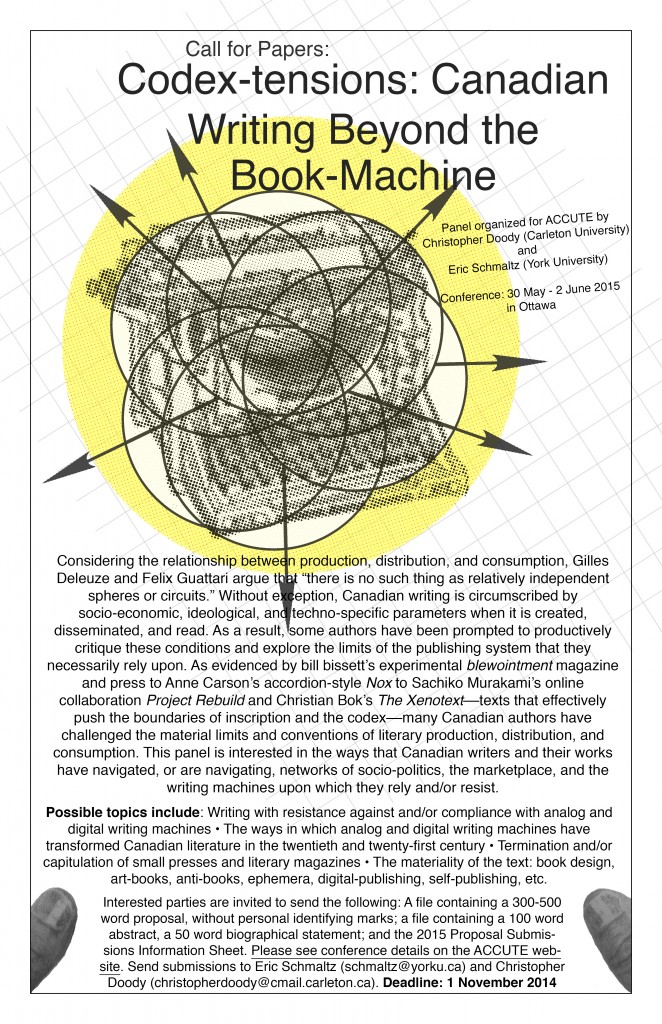
Considering the relationship between production, distribution, and consumption, Gilles Deleuze and Felix Guattari argue that “there is no such thing as relatively independent spheres or circuits.” Without exception, Canadian writing is circumscribed by socio-economic, ideological, and techno-specific parameters when it is created, disseminated, and read. As a result, some authors have been prompted to productively critique these conditions and explore the limits of the publishing system that they necessarily rely upon. As evidenced by bill bissett’s experimental blewointment magazine and press to Anne Carson’s accordion-style Nox to Sachiko Murakami’s online collaboration Project Rebuild and Christian Bok’s The Xenotext––texts that effectively push the boundaries of inscription and the codex––many Canadian authors have challenged the material limits and conventions of literary production, distribution, and consumption. This panel is interested in the ways that Canadian writers and their works have navigated, or are navigating, networks of socio-politics, the marketplace, and the writing machines upon which they rely and/or resist.
Possible topics include (but are not limited to):
- Writing with resistance against and/or compliance with analog and digital writing machines
- The ways in which analog and digital writing machines have transformed Canadian literature in the twentieth and twenty-first century
- Termination and/or capitulation of small presses and literary magazines
- The materiality of the text: book design, art-books, anti-books, ephemera, digital-publishing, self-publishing, etc.
Interested parties are invited to send the following: A file containing a 300-500 word proposal, without personal identifying marks; a file containing a 100 word abstract, a 50 word biographical statement, and the 2015 Proposal Submissions Information Sheet. Please see conference details on the ACCUTE website. Send submissions to Eric Schmaltz (schmaltz@yorku.ca) and Christopher Doody (christopherdoody@cmail.carleton.ca).
Deadline: 1 November 2014
September 5, 2014
Friday Roundup
It’s been a busy week for everyone with back to school and back to teaching, and a busy week in DH and modernism on the web. Here’s a roundup of events, CFPs, and jobs that the EMiC community might find of interest:
- The College English Association, a gathering of scholar-teachers in English studies, welcomes proposals for presentations for our 46th annual conference, on the theme of IMAGINATIONS. Conference: March 26-28, 2015 | INDIANAPOLIS, INDIANA Submission deadline: 1 November 2014 at http://cea-web.org/ The special panel chair for Digital Humanities (E. Leigh Bonds <leigh.bonds@case.edu>) welcomes proposals for papers and panels addressing the following topics:
- DH projects (digital collections/archives, digital editions, interactive maps, 3D models, etc.)
- DH research tools (text analysis, visualization, GIS mapping, etc.)
- DH pedagogy (teaching methodologies, curriculum development, project collaboration, etc.)
- DH centers (supporting research, consulting services, teaching faculty/students, etc.)
- Digital Project Management
- Data Curation
- The Future of DH
- The Northeast Modern Language Association (NeMLA) is holding its 2015 conference in Toronto, and there are a number of panels of interest to (or organized by members of) the EMiC community. Abstracts are due September 30: https://nemla.org/convention/2015/cfp.html
- Interested in becoming a Digital Humanities Specialist at the University of Alberta? The posting closes September 30. http://careers.ualberta.ca/Competition/S101324477/
- It’s back to school at HASTAC too, and they’ve got lots going on
- Applications for the HASTAC Scholars program are due on September 15: http://www.hastac.org/scholars/apply/form
- Proposals for the 2015 HASTAC conference are due October 15: http://www.hastac2015.org/call-for-proposals/
- The new HASTAC hub at the Graduate Centre at CUNY, The Futures Initiative, is well worth a look: http://www.gc.cuny.edu/Page-Elements/Academics-Research-Centers-Initiatives/Initiatives-and-Committees/The-Futures-Initiative
- Chronicle Vitae has recently launched a series of discussion groups that are already bringing scholars and alternative academics across many fields. You can check out the existing ones here, and there are more to come: https://chroniclevitae.com/groups
- DHSI 2015 is still a ways off, but the new three-week course schedule and course descriptions (including a number of courses designed and taught by the members of the EMiC community) are already online. Scope out the offerings here: http://dhsi.org/courses.php
- The Modernist Studies Association journal Modernism/Modernity has a new Facebook page. Check it out here: https://www.facebook.com/mod.modernity?fref=ts
- If you haven’t yet taken a look at the incredible work being done by the Modernist Magazines Project Canada, you really should: http://modmag.ca/
Happy weekend!
September 3, 2014
CFP: Virginia Woolf in the Modern Machine Age
CFP: Virginia Woolf Miscellany
Issue #88, Fall 2015: Virginia Woolf in the Modern Machine Age
The Virginia Woolf Miscellany invites submissions of papers that address the role of everyday machines in the life and/or works of Virginia Woolf. From typewriters and telephones to gramophones and the wireless; from motor-cars and combat aeroplanes to trains and department store elevators; from cameras and film projectors to ranges and hot water tanks, the commonplace technologies of the modern machine age leave their trace on Bloomsbury. To what extent are these and other machines represented, hidden, implied, avoided, embraced, or questioned by Woolf and her circle and characters? What is the place of labour and mass production, or the role of the handmade or bespoke object, in the context of such technologies and the desires with which they are implicated? What are the ramifications for the individual’s everyday navigation of modernity, domesticity, and/or community? Alternatively, what is the influence of everyday technologies in our own interactions with Woolf and her writings? Please submit papers of no more than 2500 words to Ann Martin (ann.martin@usask.ca) by 31 March 2015.
